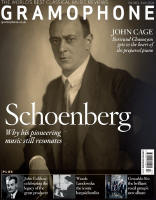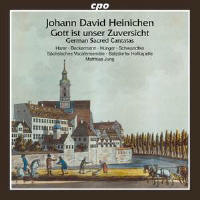Texte paru dans: / Appeared in:
|
|
|
|
|
|
Gelobet sei der Herr (St John’s Day, June 24) is performed expertly by the small orchestra Batzdorfer Hofkapelle led by violinist Daniel Deuter, the wellbalanced 21 choral singers of Sächsisches Vocalensemble and four accomplished soloists, who often lead from the front in choruses. Vocal-concerto movements that reiterate the first line ‘Praise be to God’ include beguiling interactions between graceful violins, contoured basses, supportive continuo players and dulcet soprano Magdalene Harer, and a bass aria sung suavely by Felix Schwandtke. Italianate sunniness shines upon contrapuntal strings and voices throughout the opening chorus of Lass dichs nicht irren. The parable of the rich man and poor Lazarus (the gospel reading for the first Sunday after Trinity) is retold by tenor Tobias Hunger in a compassionate recitative that segues into his contemplative aria featuring lovely pizzicato violins and tick-tock continuo chords for a pair of theorbos and organ.
There are traces of late 17th-century models in the earnest melancholy of the concise Der Segen des Herrn machet reich (fifth Sunday after Trinity) and in the integration of solo voices, polyphonic choral interjections and strings throughout Gott ist unser Zuversicht (a plangent setting of Psalm 46). The introductory sonata of Der Herr ist nahe has a Corellian tinge. After its fugal chorus and arias for each of the four soloists – such as a pious invitation to cease weeping and a measured announcement that death and hell have been overcome by ‘the lion’ – the Easter cantata ends with an attractive treatment of a stanza from Jesu meine Freude. There are about a dozen more early Heinichen German church cantatas, so it would be welcome if the everenterprising CPO were to use this as a springboard for a complete series. |
|




